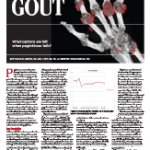In conclusion, both genetics and antibody formation can lead to treatment failure. However, to our knowledge this is the first reported case of complete pegloticase failure in which reduction in PUA was never obtained at any point during treatment. The likely reason for this may be an underlying genetic predisposition, potentially in one of the renal-urate transporters, which led to multiple treatment failures in this patient.
As genomic research and our understanding of the pathophysiology of gout progress, further targets for drug development are being identified.9 One such advance is the development of lesinurad, which targets URAT1, and will hopefully lead to more potential treatment options for such patients as these in the future.

Diana M. Girnita, MD, PhD, is a rheumatology fellow at the University of Cincinnati in the Department of Immunology, Allergy and Rheumatology.
Cody Lee, MD, is a third-year internal medicine resident at the University of Cincinnati in the Department of Internal Medicine.
Christine Chhakchhuak, MD, is an assistant professor at the University of Cincinnati, in the Department of Immunology, Allergy and Rheumatology. She is board certified in rheumatology and internal medicine.
References
- Baraf HS, Becker MA, Gutierrez-urena SR, et al. Tophus burden reduction with pegloticase: Results from Phase 3 randomized trials and open-label extension in patients with chronic gout refractory to conventional therapy. Arthritis Res Ther. 2013 Sep 26;15(5):R137.
- Sundy JS, Baraf HS, Yood RA, et al. Efficacy and tolerability of pegloticase for the treatment of chronic gout in patients refractory to conventional treatment: Two randomized controlled trials. JAMA. 2011 Aug 17;306(7):711–720.
- Hershfield MS, Ganson NJ, Kelly SJ, et al. Induced and pre-existing anti-polyethylene glycol antibody in a trial of every 3-week dosing of pegloticase for refractory gout, including in organ transplant recipients. Arthritis Res Ther. 2014 Mar 7;16(2):R63.
- Lipsky PE, Calabrese LH, Kavanaugh A, et al. Pegloticase immunogenicity: The relationship between efficacy and antibody development in patients treated for refractory chronic gout. Arthritis Res Ther. 2014 Mar 4;16(2):R60.
- Reginato AM, Mount DB, Yang I, et al. The genetics of hyperuricaemia and gout. Nat Rev Rheumatol. 2012 Oct;8(10):610–621.
- Vitart V, Rudan I, Hayward C, et al. SLC2A9 is a newly identified urate transporter influencing serum urate concentration, urate excretion and gout. Nat Genet. 2008 Apr;40(4):437–442.
- Zhang L, Spencer KL, Voruganti VS, et al. Association of functional polymorphism rs2231142 (Q141K) in the ABCG2 gene with serum uric acid and gout in 4 US populations: The PAGE Study. Am J Epidemiol. 2013 May 1;177(9):923–932.
- Tin A, Woodward OM, Kao WH, et al. Genome-wide association study for serum urate concentrations and gout among African Americans identifies genomic risk loci and a novel URAT1 loss-of-function allele. Hum Mol Genet. 2011 Oct 15;20(20):4056–4068.
- Diaz-torné C, Perez-herrero N, Perez-ruiz F. New medications in development for the treatment of hyperuricemia of gout. Curr Opin Rheumatol. 2015 Mar;27(2):164–169.


